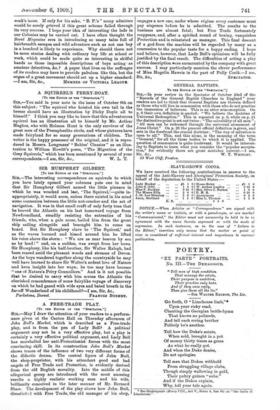A FREE-TRADE PLAY.
FTO TEL EDITOR OF TILE SPECTATOR.']
SIE,—May I draw the attention of your readers to a perform- ance given at the Caxton Hall on Thursday afternoon of John Bull's Market, which is described as a Free-trade play, and is from the pen of Lady Bell? A political argument may not be a very effective play, but a play is certainly a very effective political argument, and Lady Bell has marshalled her anti-Protectionist forces with the most -convincing skill. In its construction John Bull's Market shows traces of the influence of two very different forma of the didactic drama. The central figure of John Bull, the shop-proprietor, with his attendant good and bad angels of Free Trade and Protection, is evidently derived from the old English morality. Into the middle of this allegorical group are introduced with the most amusing results a highly realistic working man and his wife, brilliantly conceived in the later manner of Mr. Bernard Shaw. The development of the play shows how John Bull, dissatisfied with Free Trade, the old manager of his shop,
engages a new one, under whose regime every customer must pay sixpence before he is admitted. The results to the business are almost fatal; but Free Trade fortunately reappears, and, after a spirited round of boxing, vanquishes Protection and is reinstated as manager. This final descent of a god from the machine will be regarded by many as a concession to the popular taste for a happy ending. I hope and believe, however, that Lady Bell's optimism will be fully justified by the final result. The difficulties of acting a play of this description were surmounted by the company with great success. I may particularly mention the clever performance of Miss Hugolin Haweis in the part of Polly Craik.—I am,






























































 Previous page
Previous page